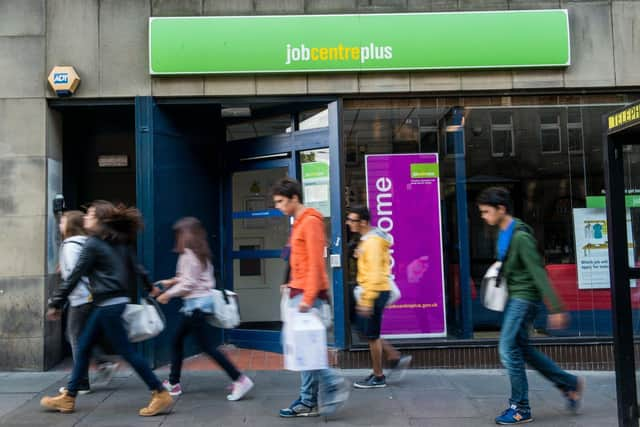In depth: gloomy RBS data on Scottish jobs market clouds outlook for rest of 2023
According to the latest Royal Bank of Scotland (RBS) Report on Jobs survey, one of the most authoritative studies of the subject, hiring conditions across Scotland deteriorated in August, with sharp decreases in both permanent placements and temp billings.
The study, which is compiled by S&P Global from responses to questionnaires sent to around 70 Scottish recruiters, saw the flagship permanent placements index experience a renewed fall to 45.5 from a “brief” rise to 55.2 in July. This marks a slip into contraction from expansion, with a reading above 50 indicating an overall increase compared to the previous month, and below 50 an overall decrease.
Advertisement
Hide AdAdvertisement
Hide AdRBS added that the rate of contraction was the strongest since April, with recruiters often linking the reduction to weaker economic conditions and a shortage of suitable candidates, although the downturn was much slower than seen at the UK level.


As for temporary billings, this index came in at 39.7, which RBS said showed the metric had experienced a “steeper” drop and “stagnated”, representing an 11th successive monthly reduction midway through the third quarter. The speed of the decrease, having eased in July, quickened “notably” to the fastest since May and was marked overall, attributed anecdotally to a lack of new work at clients. Furthermore, the report pointed out, the rate at which temp billings contracted in Scotland was much faster than across the UK as a whole, with the latter seeing a marginal reduction following a three-year period of growth.
Turning to labour supply, the permanent candidate availability index clocked in at 38.5 for August, stretching the current run of decrease that began in February 2021. The rate of contraction picked up from July and was the fastest in eight months, and was linked to increased hesitancy among people to move roles amid the current economic climate as well as skill shortages, while it contrasted with a rapid increase in permanent candidate numbers at the UK level.
The temp labour supply, in turn, fell “modestly”, with this index at 47.8, continuing a drop seen each month since March 2021, with recruiters often citing a general shortage of skilled labour. While the rate of reduction picked up from July, it remained much softer than those recorded a year ago and was broadly in line with the series average, NatWest-owned RBS said. In contrast, the supply increased at the UK level at a rapid clip.
The lender also looked at pay pressures, which it said picked up slightly from July, as shortages of skilled candidates continued to drive up starting salaries and wages. Salaries awarded to permanent new joiners in Scotland continued to increase last month, with this index settling at 61.7, extending the current sequence of pay growth that began in December 2020. The rate of salary inflation was faster than both the historical average and the UK-wide trend.


Pivoting to temp pay packets, these increased on average in August, as has been the case in each of the last 33 months, to see the relevant index reaching 57.7. The pace of temp wage inflation quickened for the second successive month, to signal a sharp rise that was again stronger than the UK-wide figure, and some recruiters said an ongoing shortage of skilled candidates had pushed up hourly pay rates.
The last metric covered in the report is the permanent vacancies index, which is derived from eight sectoral indices of the demand for such staff at recruitment consultancies, and in August was 49, declining following a two-and-a-half-year period of expansion, although the rate of contraction was “modest” all in all.
Meanwhile, growth of demand for permanent labour cooled across the UK as a whole, with vacancies rising only fractionally overall. The executive and professional sector saw the steepest drop, at 41.4, although that was an improvement from the 40 seen in July, followed by hotel and catering that swung from expansion of 50.6 in July to 45.6. However, IT and computing put in the best performance at 56.1, followed by 55.1 for “blue collar” roles.
Advertisement
Hide AdAdvertisement
Hide AdThe RBS report comes just week after figures from the Office for National Statistics showed that, across the UK, the number of vacancies in May to July 2023 fell by 66,000 from the prior quarter to 1.02 million. However, the number of unemployed people per vacancy increased in April to June to 1.4 from 1.2 in the prior three-month period.
Kate Shoesmith, deputy chief executive of the Recruitment & Employment Confederation, which helped put together the latest RBS report, said in response to the ONS figures: “The unemployment rate is marginally above most predictions and we’re getting a sense of a loosening jobs market – where the demand for talent in certain sectors remains high, while there is a fall back in demand in other key sectors.” She also said the total number of vacancies still exceeding one million calls for a better job-matching service, adding that the ONS figures overall showed “why we need a plan for economic growth and investment in the UK”.
Sebastian Burnside, chief economist at RBS, said regarding the lender’s Report on Jobs report for August: “The latest survey data highlighted renewed weakness across the Scottish labour market. A smaller pool of desirable and skilled candidates and the muted economic climate meant that hiring activity remained subdued during August.
"Moreover, fewer work opportunities translated into a reduction in permanent vacancies. Nonetheless, both starting salaries and wages continued to rise at historically strong rates. Competition for scarce and skilled candidates often meant that firms had to pay more to secure the right talent.
“Going forward, with fewer vacancies in the market, and firms already limiting their hiring, the survey suggests a weaker outlook for the Scottish labour market in the remaining months of 2023.”
Comments
Want to join the conversation? Please or to comment on this article.